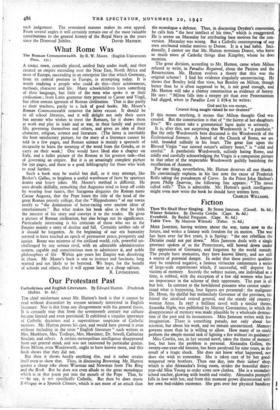Our Protestant Past
Tuts chief misfortune aoout Mr. Hutton's book is that it cannot be read without discomfort by anyone seriously interested in English literature. Nor is this from any disagreement with his general thesis. It is certainly true that from the seventeenth century our culture became limited and even provincial: It exhibited a singular ignorance of Catholic doctrines and a superstitious suspicion of Catholic motives. Mr. Hutton proves his case, and would have proved it even without including in the term " English literature " such writers as Mrs. Markham, Mrs. Trollope, Mrs. Mortimer, Dr. Sewell, Catherine Sinclair, and others. A certain metropolitan intelligence disappeared from our general mind, and was not recovered by particular genius. Even Milton, even Wordsworth, ought to have known more, and this book shows that they did not.
But then it shows hardly anything else, and it rather strains itself even to show that. Thus, in discussing Browning. Mr. Hutton quotes a cheap ioke about Wiseman and Newman from The Ring and the Book But he does not even allude to the great monologue which is in that poem put into the mouth of the Pope That, he 'ht say, is not specifically Catholic. But then he does auote S-/i/oquy in a Spanish Cloister, which is not more of an attack than the monologue a defence. Thus, in discussing Dryden's conversion, he calls him " the best intellect of his time," which is exaggerated. He is severe on Macaulay for attributing base motives for the con- version. Macaulay was wrong. But a Catholic contemporary of our own attributed similar motives to Donne. It is a bad habit. Inci- dentally, I cannot see that Mr. Hutton mentions Donne, who knew so much more of Catholic things than Kingsley, whom he does mention.
The great division, according to Mr. Hutton, came when Milton refused to write, in Paradise Regained, about the Passion and the Resurrection. Mr. Hutton evolves a theory that this was the original scheme! I find his evidence singularly unconvincing. He shows that Bentley held that view, but Bentley on Milton, though better than he is often supposed to be, is not good enough, and Mr. Hutton will take a clumsy construction as evidence of heresy. He says: "Milton falls into a steeper pit than ever Protestantism had digged, when in Paradise Lost ii 678-9 he writes: God and his son except,
Created thing naught valued he nor shunned"
If this means anything, it means that Milton thought God was created. But the construction is that of " the fairest of her daughters Eve." We cannot take a grammatical lapse quite so seriously.
It is, after this, not surprising that Wordsworth is " a pantheist." But the only Wordsworth here discussed is the Wordsworth of the Ecclesiastical Sonnets. A hatred of the Church of Rome, we are told, brooded sullenly in his heart. The great line upon the Blessed Virgin " our tainted nature's solitary boast," is " cold and careful." A pantheistic Wordsworth, sullenly hating Rome, and coldly and carefully acknowledging the Virgin is a companion picture to that other of the respectable Wordsworth guiltily banishing the recollection of Annette.
For one thing, nevertheless, Mr. Hutton deserves all our thanks. He convincingly explains in his last note the cause of Frederick Rolfe taking the pseudonym of Corvo. In the Priest John Skelton's poem Philip Sparrow, the following line appears: " The raven called rolfe." This is admirable. Mr. Hutton's quick intelligence might even now write the book he should have written here.
CHARLES WILLIAMS.


























 Previous page
Previous page